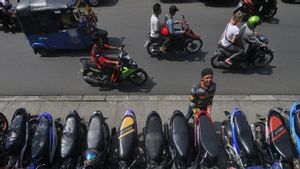JAKARTA The closure of the Bata shoe factory in Purwakarta in early May was regretted by many parties, especially employees at the factory. Bata is considered less innovating, making it difficult to compete with other shoes.
Bata Director and Secretary, Hatta Tutuko said this closure was carried out to maintain the long-term business continuity.
"Bata feels the need to transform to serve consumers better. Companies can no longer continue production at factories in Purwakarta and instead the company will offer new interesting products designed and developed by Bata and local producers from our partner factories in Indonesia. Many of them have worked with us before, "Hatta said in his statement.
Director of the Center of Economics and Law Studies (CELIOS) Bhima Yudhistira said Bata's decision to permanently close operations is an indication of a slowdown in the footwear industry sector.
Meanwhile, a marketing observer from Inventure, Yuswohady, assessed that the shoe brand was late in responding to digital developments and changes in market tastes.
Bata, a shoe company from the Czech Republic, first appeared in Indonesia in 1931. Initially Bata collaborated with colonial company Netherlandsch-Indisch as a shoe importer operating in Tanjung Priok.
Six years later the first factory was established in the middle of a rubber plantation in the Kalibata area, South Jakarta. Then in 1994 Bata built the largest factory in Purwakarta, while the factory in Kalibata no longer existed.
However, based on the company's financial statements as of December 31, 2023, PT Sepatu Bata Tbk recorded a current year's loss of IDR 190.5 billion, compared to the previous year which was only IDR 106.1 billion.
Meanwhile, Bata's net sales were recorded at IDR 609.61 billion in 2023, down from the previous year, which was IDR 643.45 billion. In the information disclosure report, management revealed that the company's losses had occurred for four years since the COVID-19 pandemic.
The permanent closure of the Bata factory in Purwakarta, West Java has attracted the concern of many circles. Not a few say Bata lost its customers due to lack of innovation. However, Bhima has other views. According to him, footwear imports from Vietnam and China took part in the weakness of the country's footwear industry.
Bhima explained that the total footwear imports from China reached 559 million US dollars in 2022 while imports from Vietnam were 269 million US dollars in the same period.
"Indeed, Bata has long lost the market. But it's not just because of the loss trend of footwear models that people like," Bhima told VOI.
There has been a massive contribution from footwear imports over the past 10 years from Vietnam and China. The factory lost competitively because goods from Vietnam were cheaper, many illegal imported goods were also without being subject to import duties," he continued.
In addition, Bhima also highlighted domestic regulations that are considered less friendly for footwear manufacturers due to tightening for imports to discuss standards.
"This is a hassle for imports of raw materials to be limited, while imports of goods will be made through toll roads without strict arrangements. No wonder footwear entrepreneurs choose to be importers rather than have to continue factory operations," he said again.
Since entering Indonesia in the era before independence, Bata shoes already have their own customers. Big children in the 1990s were definitely close to Bata, because these shoe brands were among the most popular of the time.
But Bata doesn't keep up with the times. Bata has already received a label as a local brand, not a global brand, even though she is not an Indonesian brand. In addition, Bata has the impression of being a shoe for the lower middle class, which is avoided by millennials and Z.
Yuswohady said Bata was battered by three disruptions at once, namely digital disruption, millennial disruption, and disruption of the COVID-19 pandemic. The three disruptions caused the legendary shoe brand to fall.
According to Yuswodady, there are causes that are SHort terms, medium term, and long term. Forshort term, he said the COVID-19 pandemic had a direct impact.
"We know that the pandemic is that people cannot leave their homes, while most of Bata's shoe shops are offline, Bata shops that are connected with cities or districts. Because the segment is rather medium and lower. So when it comes to the pandemic, the shop is quiet. So the demand has dropped, and the turnover has dropped, and it has been proven in the financial statements of the last four years since 2020, it has dropped," said Yuswohady.
SEE ALSO:
At the medium term level, Bata is considered to have problems responding to digital waves. Before the world was hit by a pandemic, Bata slowly digitized its operating process.
Even though at that time, many local shoes had emerged that were agile in utilizing digital technology to compete with foreign brands. Examples of local brands include Compass, Brodo, Aerostreet, and so on.
Yuswohady said, the new players managed to take advantage of digital channels, even creating a trend of fear of losing moments or being popular with the term FOMO (Fear of Missing Out), thus creating something viral in society.
Finally, the most fundamental disruption is that Bata experiences brand aging. Bata as a global brand experiences abrand localization or perceived as a local brand.
Yuswohady said Bata failed to keep up with the tastes of the newer generation of consumers, namely millennial consumers and gen Z. Moreover, in terms of quality and branding, Bata gets a bad perception and is considered outdated.
The birth of millennials and Z is what Yuswohady thinks is the turning point for the Bata brand, because the two generations have different clothing style preferences compared to the previous generation.
"Bata is considered a representation of the old generation, boomers and Gen X. That's why this millennial generation considers Bata as a colonial brand, so that it experiences aging," said Yuswohady.
The English, Chinese, Japanese, Arabic, and French versions are automatically generated by the AI. So there may still be inaccuracies in translating, please always see Indonesian as our main language. (system supported by DigitalSiber.id)


















